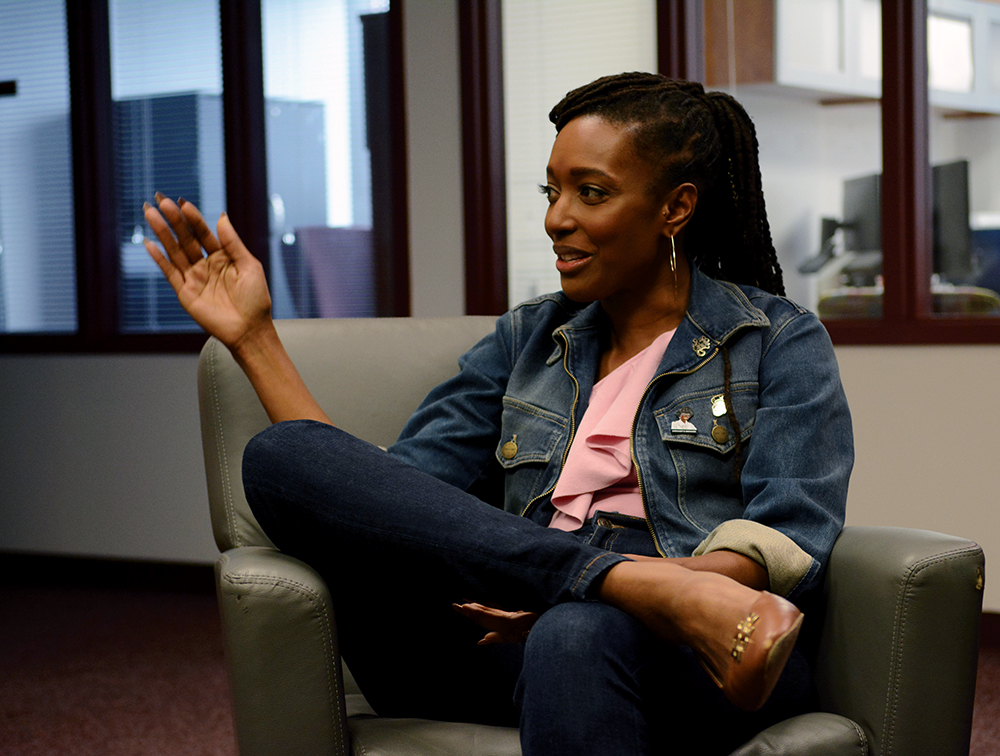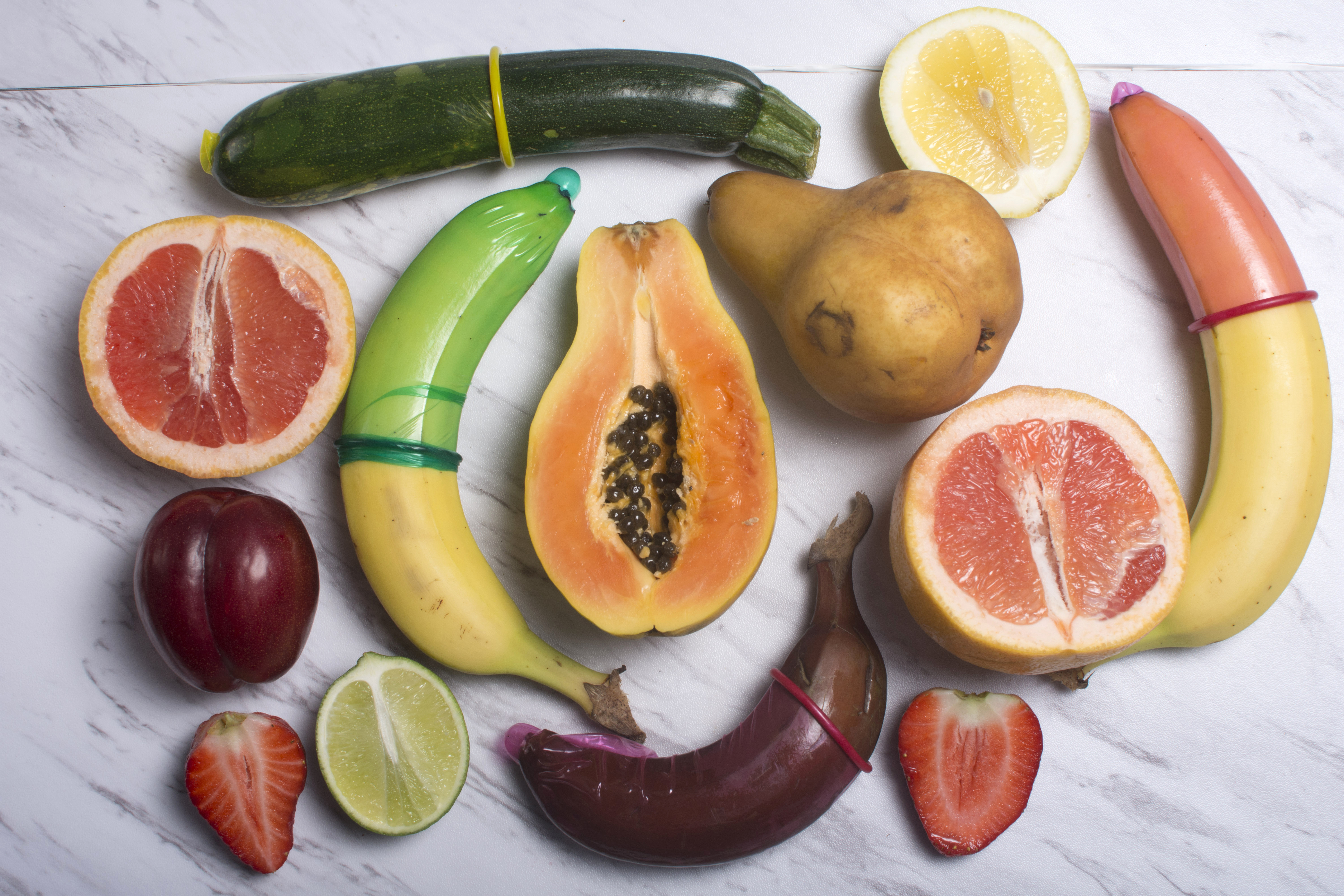Sam Feldstein/Staff Photographer
Franchesca Ramsey, social media activist and host of MTV’s Decoded, looks at a reporter while answering a question asked during a press interview in the African American Cultural Center in Witherspoon Monday, Oct. 23. Ramsey was the guest speaker selected to headline the campus Diversity Dialogue as part of Diversity Week.
Keilah Davis | Managing Editor
On October 23, Franchesca Ramsey, the current host and executive producer of the MTV web series “Decoded,” delivered a talk entitled, “Your Powerful Online Voice: Social Media for Social Change” in Witherspoon Campus Cinema. Ramsey was the Fall Diversity Dialogue keynote speaker for the Office of Institutional Equity and Diversity’s Diversity Education Week 2017.
She began her presentation by introducing the concept of privilege through an illustrated story about a caterpillar and a snail.
In the story, the two friends’ journey to a party comes to a halt when the snail’s shell prevents it from getting past a fence that the caterpillar quickly crawls under. Ramsey’s cartoony voices drew laughter from the audience throughout the tale.
“Sometimes you are the caterpillar and sometimes you are the snail,” Ramsey said. “This story, on its face, just seems to be about a caterpillar and snail, but in reality it’s a story about privilege and the fact that we all have privilege.”
Ramsey explained why she chose to begin by discussing privilege and acknowledging that she is heterosexual, cisgender, and able-bodied.
“In my experience, I found that if I talk about my own privilege it can help people be more cognizant of the privileges that they have and the life experience it affords them,” Ramsey said.
Ramsey explained how she got her start in media when she began wearing locs and sought out help online. She found a group called Get Up, Dread Up on LiveJournal, but most of its members were white.
“Where are all the black people?” Ramsey said. “I was one of two, and at that time the natural hair space online was nothing like what it is now, so I decided to start making my own videos about my natural hair journey. I figured if I need help and don’t know where to turn to, maybe there are other people in similar positions.”
Ramsey continued making hair, beauty and comedy videos until 2011, when she made her most popular video to-date, “Sh*t White Girls Say to Black Girls.” She created the video as a response to the viral “Sh*t Girls Say” and its viral parodies like “Sh*t Black Girls Say.”
“I uploaded this video before I went to work,” Ramsey said, “and when I went to lunch, I had 1.5 million views. For one day, I was officially more popular than Justin Bieber.”
After showing the video, Ramsey explained why this video was so significant for her career.
“I thought this was just a video about my life experience growing up in West Palm Beach and going to Catholic school and being the only black girl in my circle of friends,” Ramsey said. “But in reality, this video was about the experience of microaggressions, which are not something that are exclusive to black people or people of color. This is something marginalized people often face when they are in spaces with privileged folks, and they’re really those unintentionally harmful and hurtful comments that really just highlight someone’s privilege.”
The popularity of this video caused Ramsey to pivot from hair and beauty to comedy and social justice in her videos.
Since then, Ramsey has written for “The Nightly Show” and “Black Girls Rock,” presented at film festivals around the world, and finished a pilot for Comedy Central.
While she has experienced great success, she has also been the target of internet trolls and harmful comments and videos.
Ramsey explained that discussing race, oppression and privilege often makes people uncomfortable, as these conversations are often perceived as blaming or attacking a particular group.
“Anger is a defense mechanism,” Ramsey said. “People get angry because they don’t know how to process the feelings that they’re having.”
According to Ramsey, being a better activist and ally starts with acknowledging and understanding your privilege, owning your mistakes, committing to change and speaking up for, but not over, marginalized people.
One student said, “I’ve watched a lot of her videos before, but it was still pretty cool to be reaffirmed in the message. I liked her use of gifs and memes, it was really engaging.”
Another student, Jake Petrillo, a first-year student in exploratory studies, said, “I really like how she talked about issues that I think push people’s comfort levels. I thought it was really interesting how almost uncensored she was about the topics she talked about.” This was Petrillo’s first time hearing about Ramsey.
Ramsey also reminded the audience that hashtags like #BlackLivesMatter, #ShoutYourAbortion, #WhyIStayed, #GirlsLikeUs and #1000BlackGirlBooks sparked conversations around the world on police brutality, access to reproductive health care, intimate partner violence, visibility of trans woman and representation in children’s books, respectively.
Most of these hashtag creators weren’t famous at the time, but were regular people who chose to speak out on social media.
“If you have something that you feel is worth saying, then the internet can definitely be a place for those conversations,” Ramsey said. “There is a place for you to reach to different people and potentially take that to a level that you never anticipated.”



